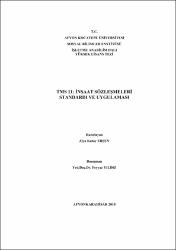| dc.contributor.advisor | Yıldız, Feyyaz | |
| dc.contributor.author | Kutay Erşen, Ziya | |
| dc.date.accessioned | 2015-03-11T11:21:51Z | |
| dc.date.available | 2015-03-11T11:21:51Z | |
| dc.date.issued | 2010 | |
| dc.date.submitted | 2010 | |
| dc.identifier.uri | http://hdl.handle.net/11630/2654 | |
| dc.description.abstract | Yıllara yaygın inşaat taahhüt işlerinde işin başlamasıyla tamamlanması farklı hesap dönemlerine girdiğinden, Gelir Vergisi Kanunu’na göre özel bir vergileme sistemine tabidir. Sözleşme gelir ve maliyetlerini işin tamamlandığı hesap dönemine erteleyerek vergilendiren bu yaklaşım, muhasebenin temel ilkelerinden “Dönemsellik İlkesi” ile çelişmekte ve faaliyetlerin devam ettiği dönemlere ilişkin gelir ve maliyetlerin muhasebeleştirilme ve raporlanması ile ilgili sorunlara neden olmaktadır. Türkiye Muhasebe Standartları Kurulu’nun çalışmaları sonucunda Uluslararası Muhasebe Standartları ile uyumlu hale getirilen Türkiye Muhasebe Standartları’nın, “TMS 11 İnşaat Sözleşmeleri” standardı ile bu sorunlar giderilmeye çalışılmıştır.
Çalışmanın teorik bölümünde Gelir Vergisi Kanunu’na göre yıllara yaygın inşaat taahhüt işlerine ait maliyet ve gelirlerin muhasebeleştirilmesi ile ilgili esaslar anlatılmış ve TMS 11 İnşaat Sözleşmeleri standardının getirdiği yenilikler incelenmiştir. Uygulama bölümünde ise Gelir Vergisi Kanunu’nun ilgili maddeleri gereğince düzenlenen mali tablolar ve dipnotlar, TMS 11 İnşaat Sözleşmeleri standardına göre düzenlenen mali tablo ve dipnotları ile karşılaştırılarak, değişiklikler incelenmiştir. | en_US |
| dc.description.abstract | Long-term construction contracts are subject to a special taxation system in the Income Tax Law by reason of commence and completion of construction works get into the different accounting periods. This approach of taxation delays the incomes and costs of the contract to the accounting period that construction completed, therefore it contradicts with the “Periodicity Principle” of basic principles of accounting and causes problems about reporting and determining the allocation of incomes and costs to the accounting periods when the construction activity is carried out. In order to solve these issues, TMS 11 Construction Contracts was put into effect by Turkish Accounting Standards Board which aligned with International Accounting Standards.
The theoretical part of this study describes the principles about accounting entry of long-term construction contract incomes and costs according to the Income Tax Law, and the innovations which is brought by the standard TMS 11 Construction Contracts has been examined. In the application part of the study, the financial statements and notes which are composed in accordance with the Income Tax Law, are compared with the financial statements and notes which are composed in accordance with TMS 11 Construction Contracts, and changes has been examined. | en_US |
| dc.language.iso | tur | en_US |
| dc.publisher | Afyon Kocatepe Üniversitesi, Sosyal Bilimler Enstitüsü | en_US |
| dc.rights | info:eu-repo/semantics/openAccess | en_US |
| dc.subject | TMS 11 | en_US |
| dc.subject | İnşaat Sözleşmeleri | en_US |
| dc.subject | Yıllara Yaygın İnşaat | en_US |
| dc.subject | Tamamlanmış Sözleşme | en_US |
| dc.subject | Tamamlanma Yüzdesi | en_US |
| dc.title | Tms 11: İnşaat Sözleşmeleri Standardı ve Uygulaması | en_US |
| dc.title.alternative | Tms 11: Construction Contracts Standard and an Application | en_US |
| dc.type | masterThesis | en_US |
| dc.department | Afyon Kocatepe Üniversitesi, Sosyal Bilimler Enstitüsü, İşletme Anabilimdalı | en_US |
| dc.authorid | TR58763 | en_US |
| dc.relation.publicationcategory | Tez | en_US |



















